Datasheet — HMS
Cinema surround loudspeaker
The HMS cinema surround loudspeaker is optimized for use in cinemas, high-end private theaters, screening rooms, and other surround applications. Designed to complement Meyer Sound’s Acheron® screen channel loudspeakers, the self-powered HMS maintains a wide dynamic range, exceptional fidelity, and precise clarity during the most demanding of digital soundtracks. Boasting a wide frequency range and a generous linear peak SPL with very low distortion, the HMS delivers the full intensity and nuance of cinema surround channels to every listener without compromise.
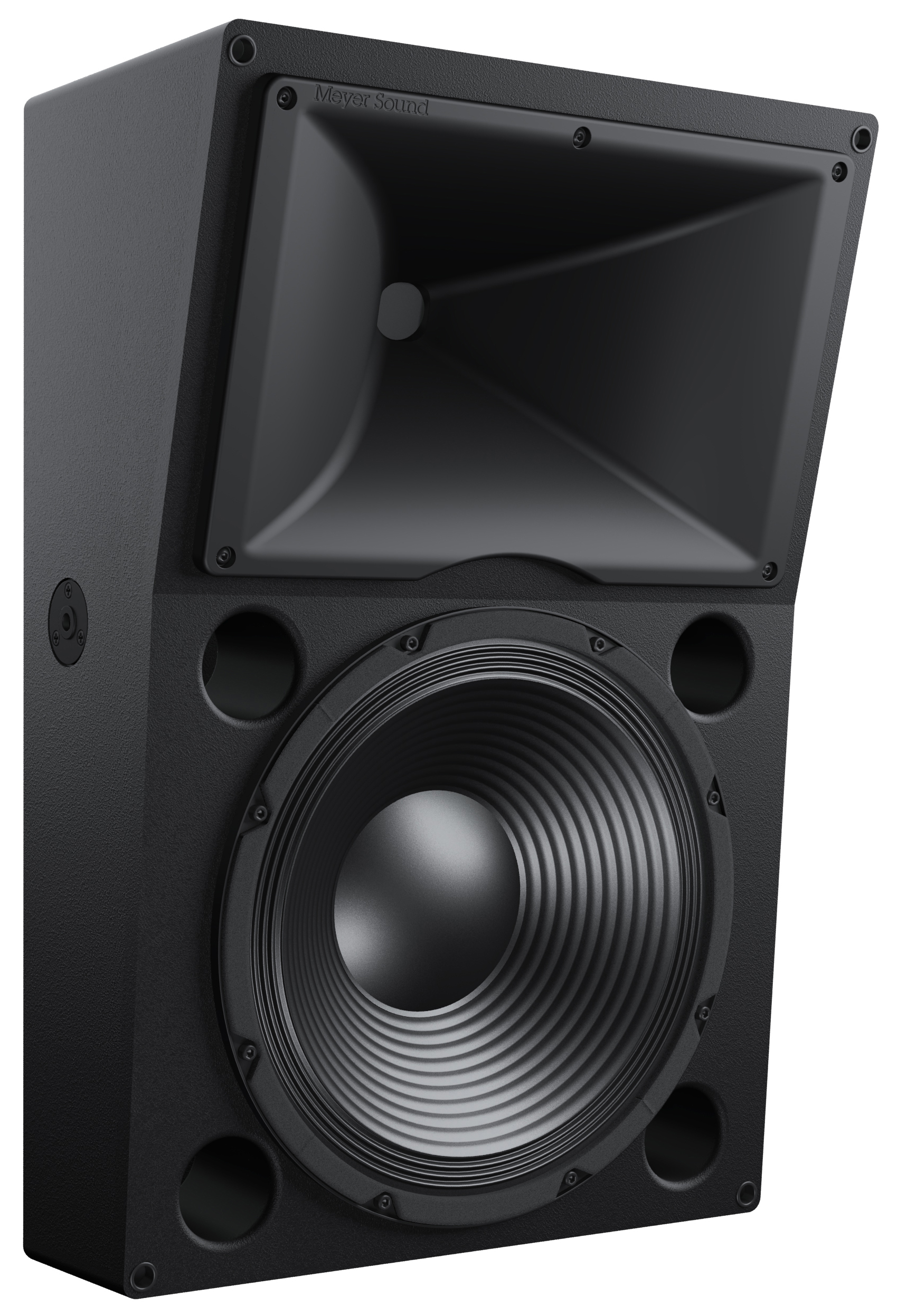
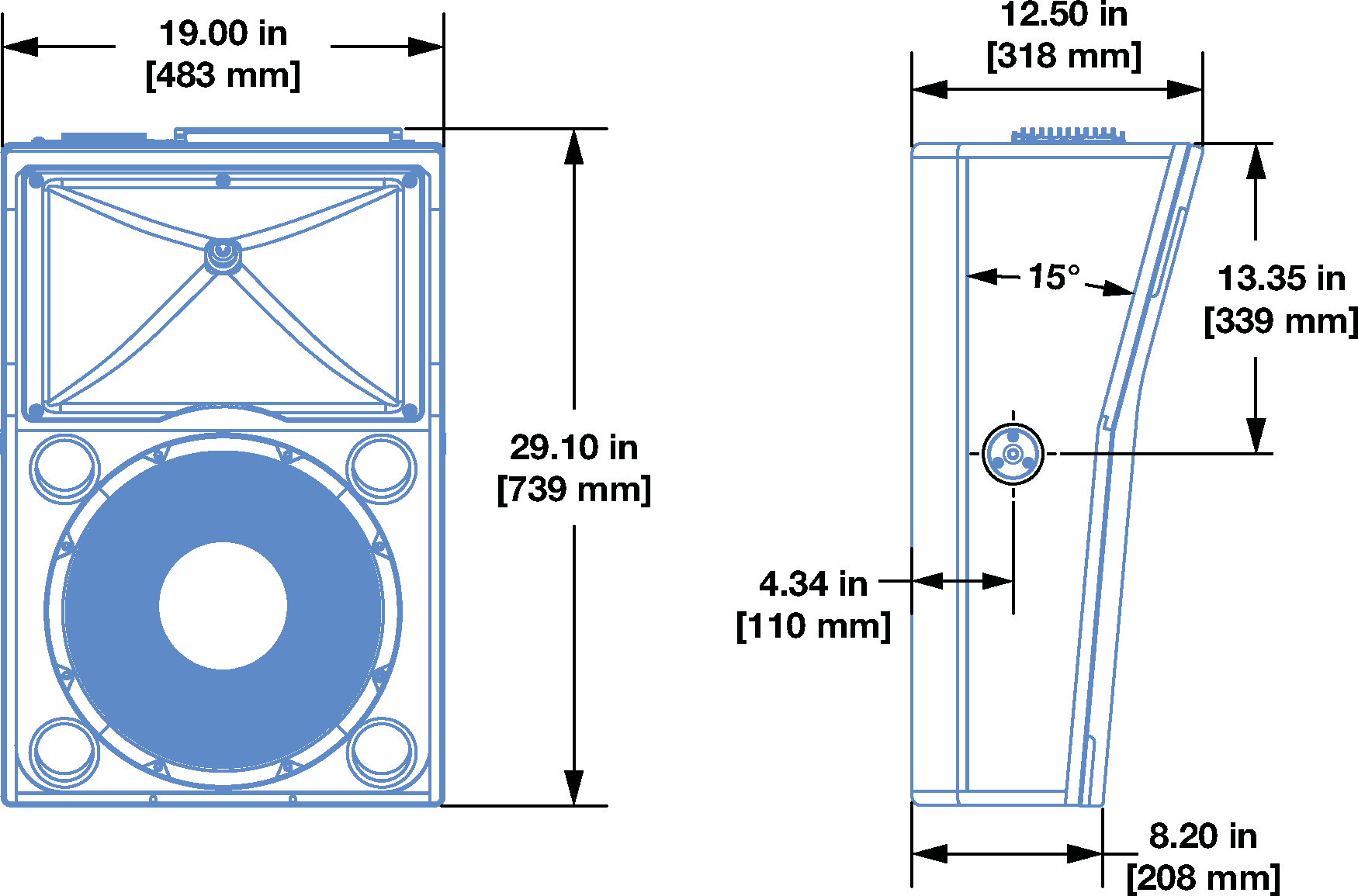
HMS-15/HMS-15AC High-Power Cinema Surround Loudspeaker and Dimensions
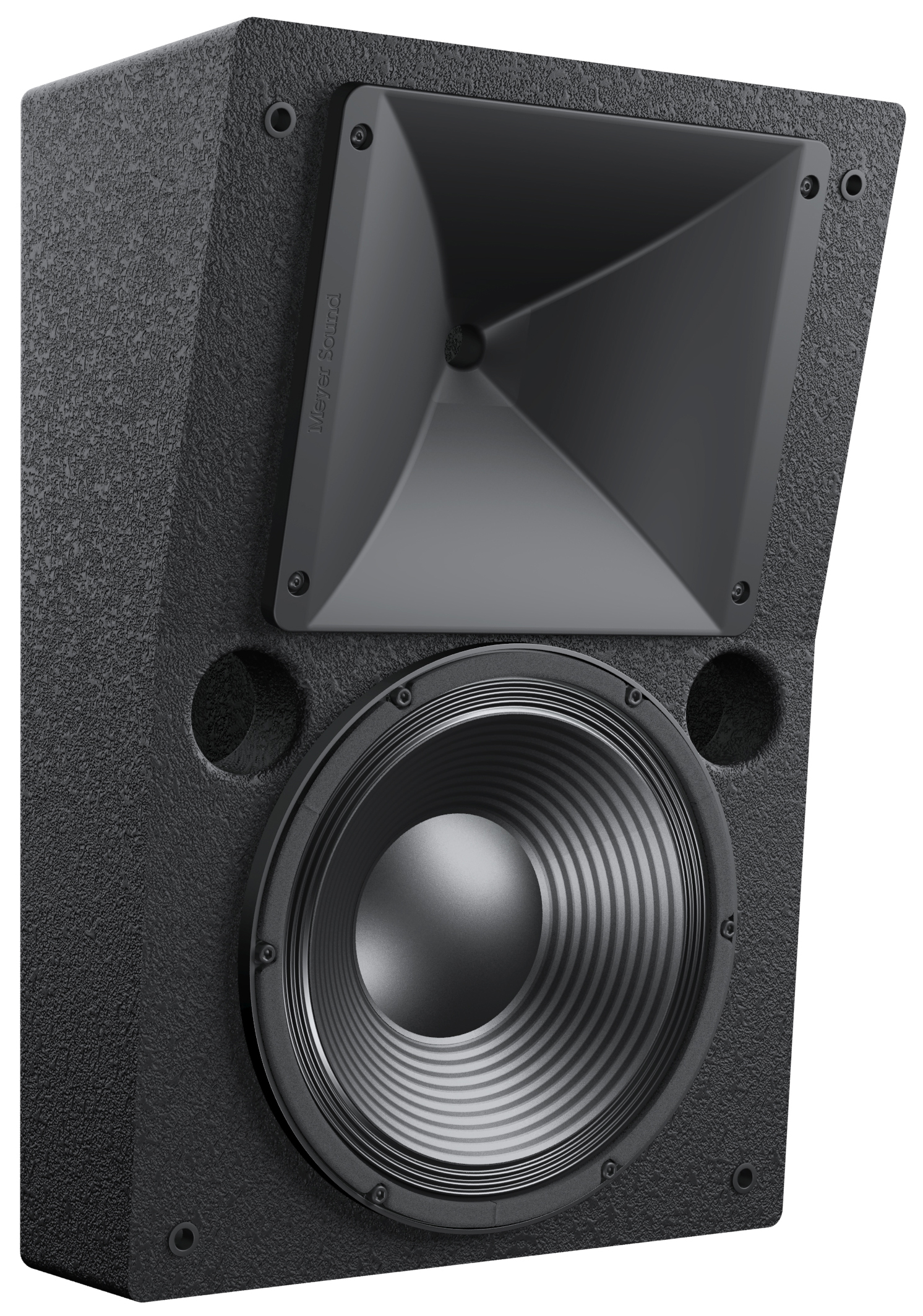
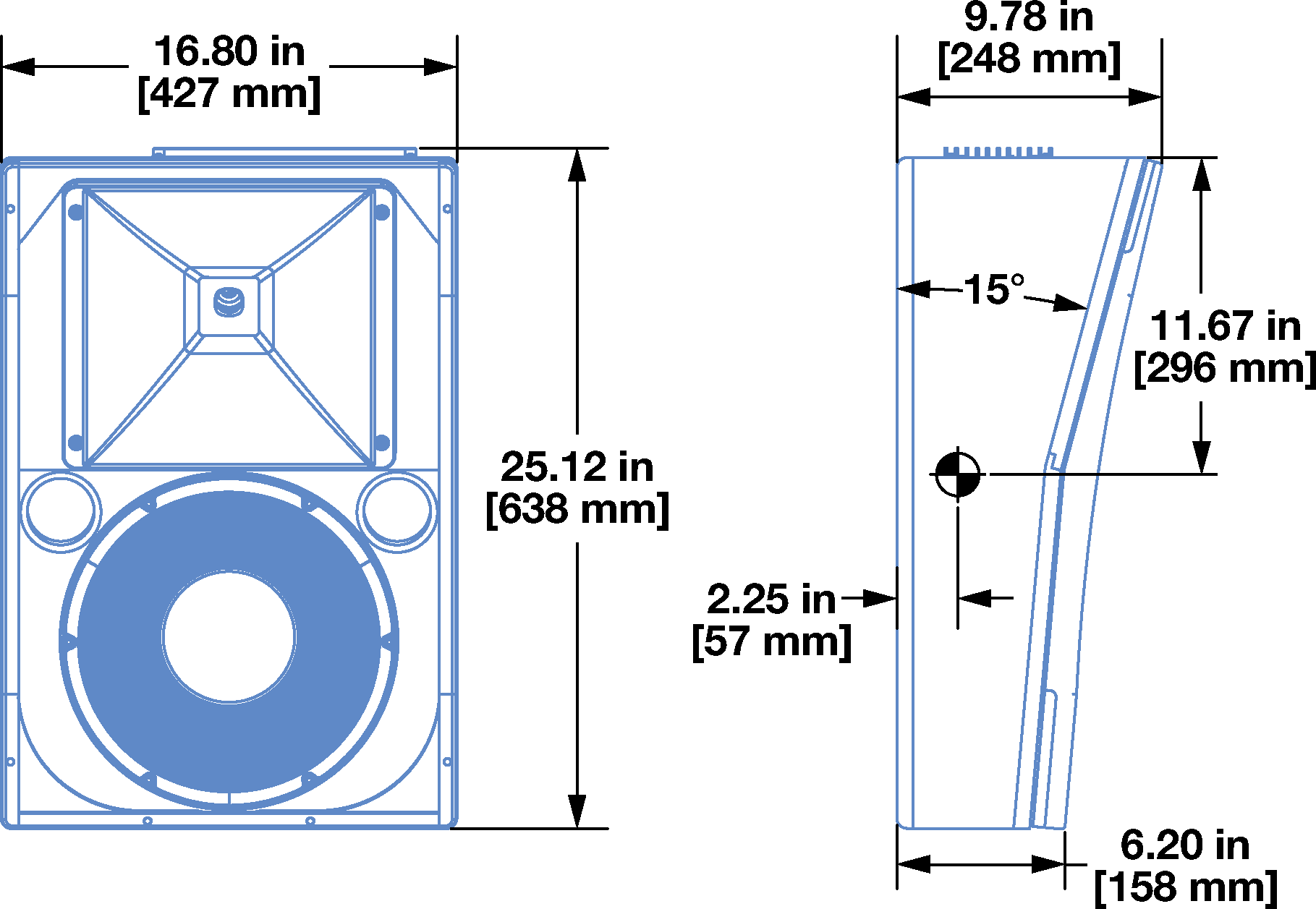
HMS-12 High-Power Cinema Surround Loudspeaker and Dimensions
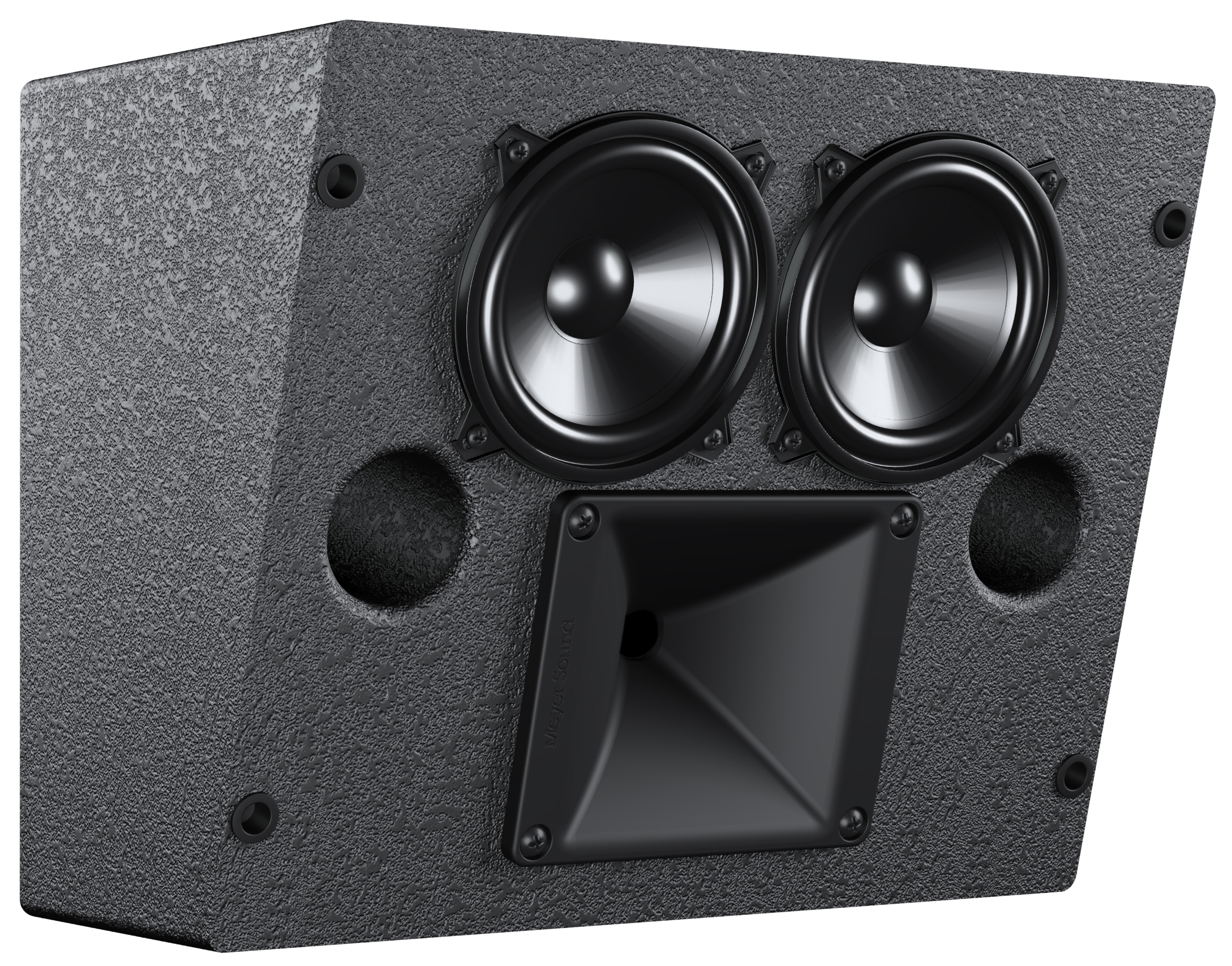
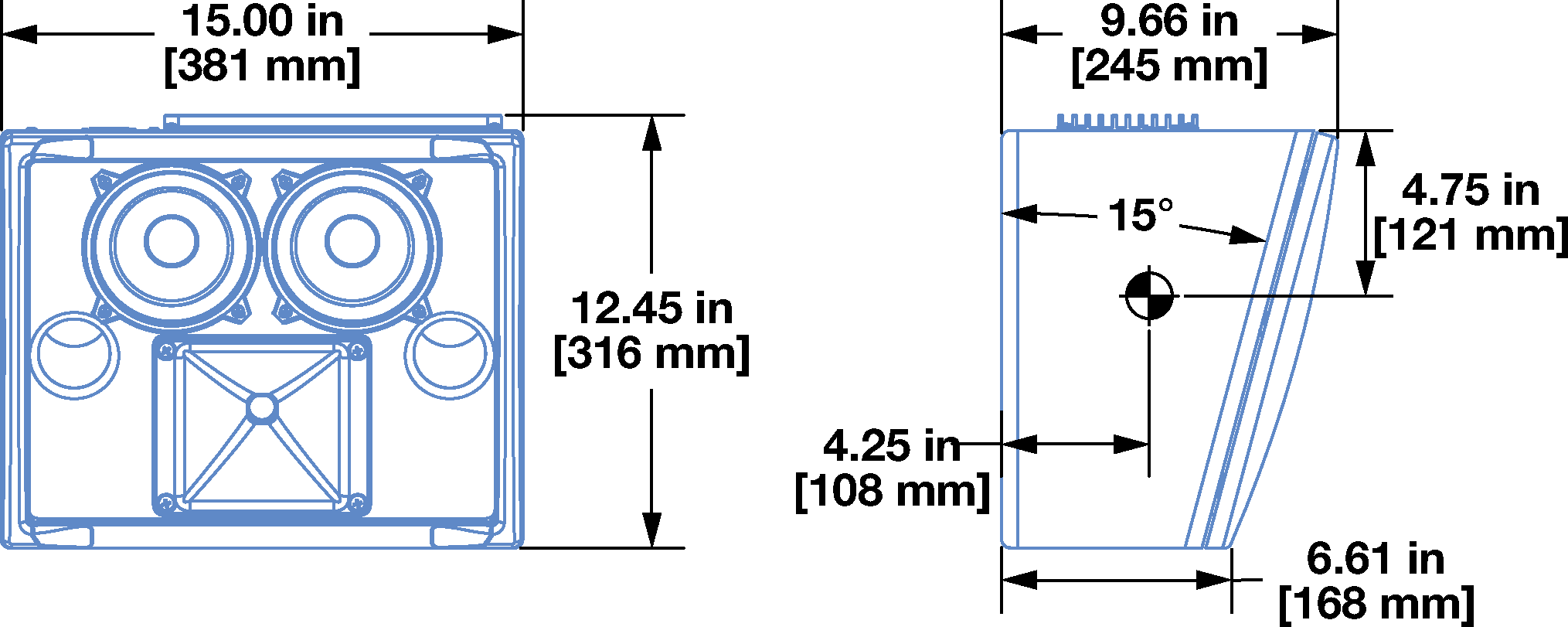
HMS-5 Compact Cinema Surround Loudspeaker and Dimensions
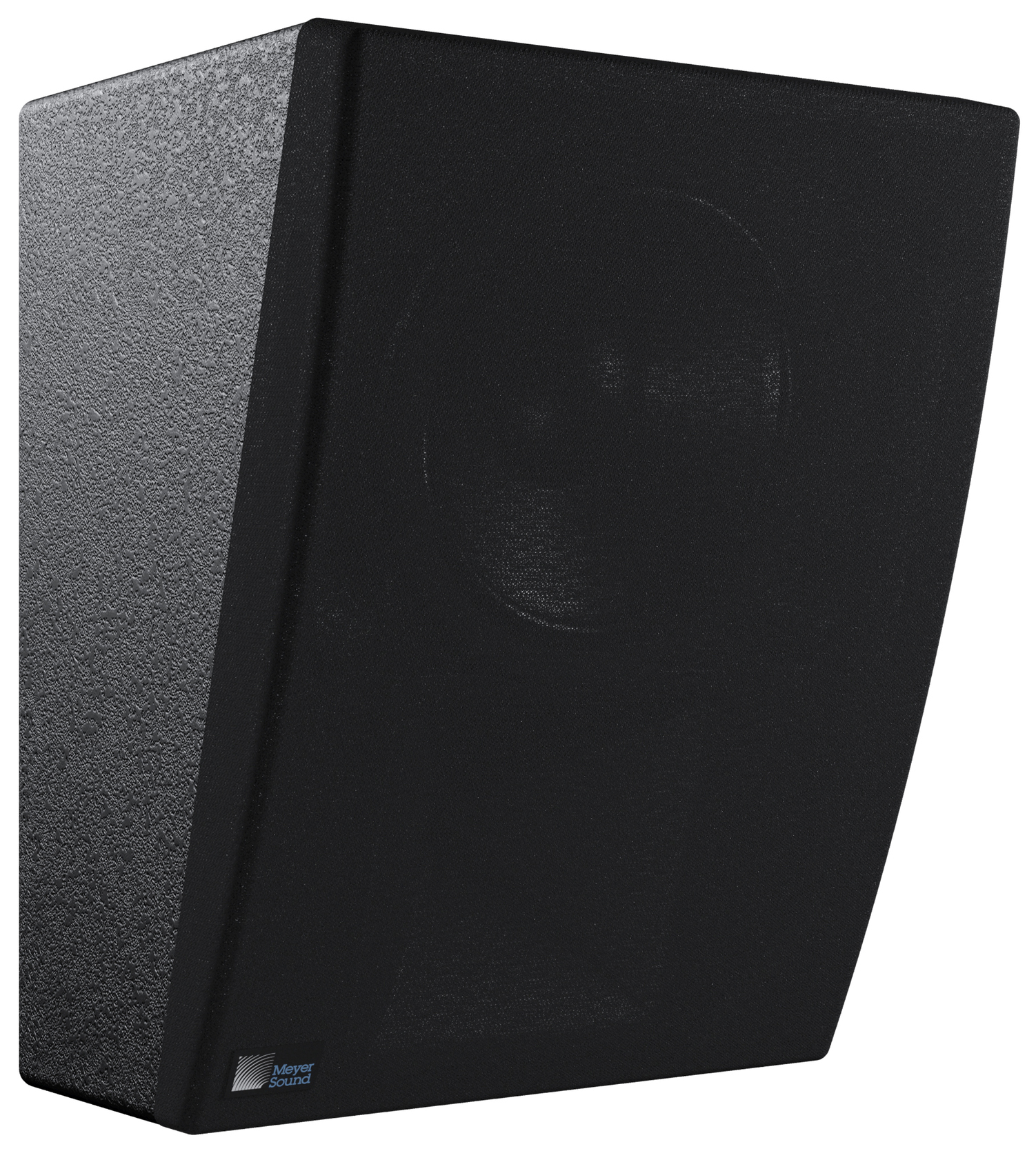
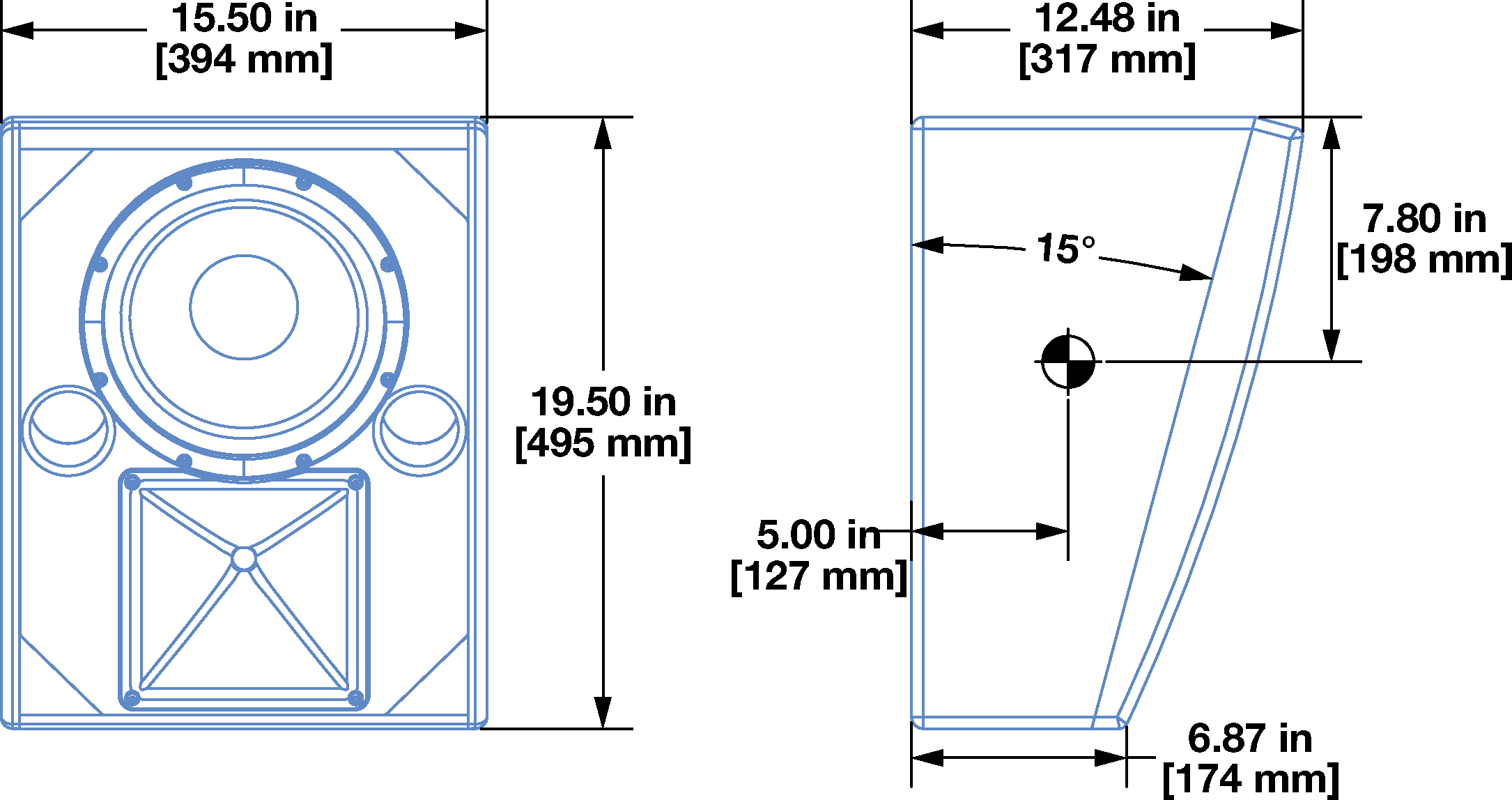
HMS-10 Cinema Surround Loudspeaker (with Grille Frame) and Dimensions
The HMS cinema surround loudspeaker is available in five models: HMS-5™, HMS-10™, HMS-12™, HMS-15™, and HMS-15AC, ranging in size, weight, driver size, and power to accommodate a wide range of venues and applications. The proprietary long-excursion cone drivers and diaphragm compression drivers are driven by an onboard amplifier that includes an active crossover, driver protection circuitry, and correction filters for flat phase and frequency response. A constant-directivity horn provides uniform, full-range, consistent coverage.
The HMS-5, HMS-10, HMS-12, and HMS-15 are equipped with IntelligentDC technology and receive DC power and balanced audio from composite Phoenix™ 5-pin connectors. Powering the loudspeakers from an external DC source eliminates the need for AC conduits while preserving the advantages of self-powered systems. IntelligentDC loudspeakers require a Meyer Sound MPS external power supply. The single-space 19-inch rack unit MPS-488HP, for example, distributes DC power and balanced audio to up to eight HMS-5, HMS-10, or HMS-12 loudspeakers, or up to four HMS-15 loudspeakers. Composite multi-conductor cables, such as Belden® 1502 or equivalent, can deliver both DC power and balanced audio to loudspeakers at cable lengths up to 150 feet with just 1 dB of loss in peak SPL using 18 AWG wire. Longer cable runs are possible with heavier gauges. The MPS-488HP is optionally available with an RMS remote monitoring system module for monitoring voltage and current draw for its attached loudspeakers from a Mac® or Windows®-based computer.
Another power source option is the two-channel MPS-482HP, which is ideal for applications requiring a small channel count or the capability for mounting remotely on a wall or ceiling. Its fanless design operates quietly in acoustically sensitive environments.
The HMS-15AC is an AC-powered version of the HMS-15. Its Intelligent AC power supply provides automatic voltage selection, EMI filtering, soft current turn-on, and surge suppression. The HMS-15AC is optionally available with its own onboard RMS remote monitoring system module for comprehensive monitoring of loudspeaker parameters from a Mac or Windows-based computer.
The versatile HMS can be suspended or mounted on walls or ceilings at fixed or adjustable angles with optional yoke, U-bracket, or wall-mount brackets, allowing it to be deployed per the requirements of any surround application or immersive cinema format.
Meyer Sound’s industry-leading self-powered technology not only delivers unparalleled and consistent audio fidelity but also simplifies installation, whether designing new rooms from scratch or adding surround channels to existing installations. The HMS cabinet features a slightly textured black finish and an acoustically transparent, detachable, black cloth grille that blend smartly with any theater decor.
Features and Benefits
Exceptional fidelity and extended high-frequency performance
Constant-directivity horn yields uniform response throughout coverage area
Seamless integration with Acheron screen channel loudspeakers and X-800C and X-400C cinema subwoofers
Extraordinarily flat amplitude and phase response for tonal accuracy
IntelligentDC power affords the flexibility of lengthy cable runs to the HMS-5, HMS-10, HMS-12, and HMS-15 without conduits
Optional mounting options provide multiple configurations for attachment to walls, ceilings, or hanging clamps
Applications
Cinemas and theaters
Screening rooms
Surround mixing for production and postproduction facilities
High-end private theaters
Immersive surround applications
Accessories and Associated Products
FMB-HMS Fixed Mount Bracket — Mounts HMS loudspeakers on walls at a fixed 0-degree angle. The fixed bracket mounts cabinets 0.87 inches (22 mm) from the wall.
Weight — 3.1 lbs (1.4 kg)
Compatibility — HMS-5, HMS-10, HMS-12, HMS-15/15AC
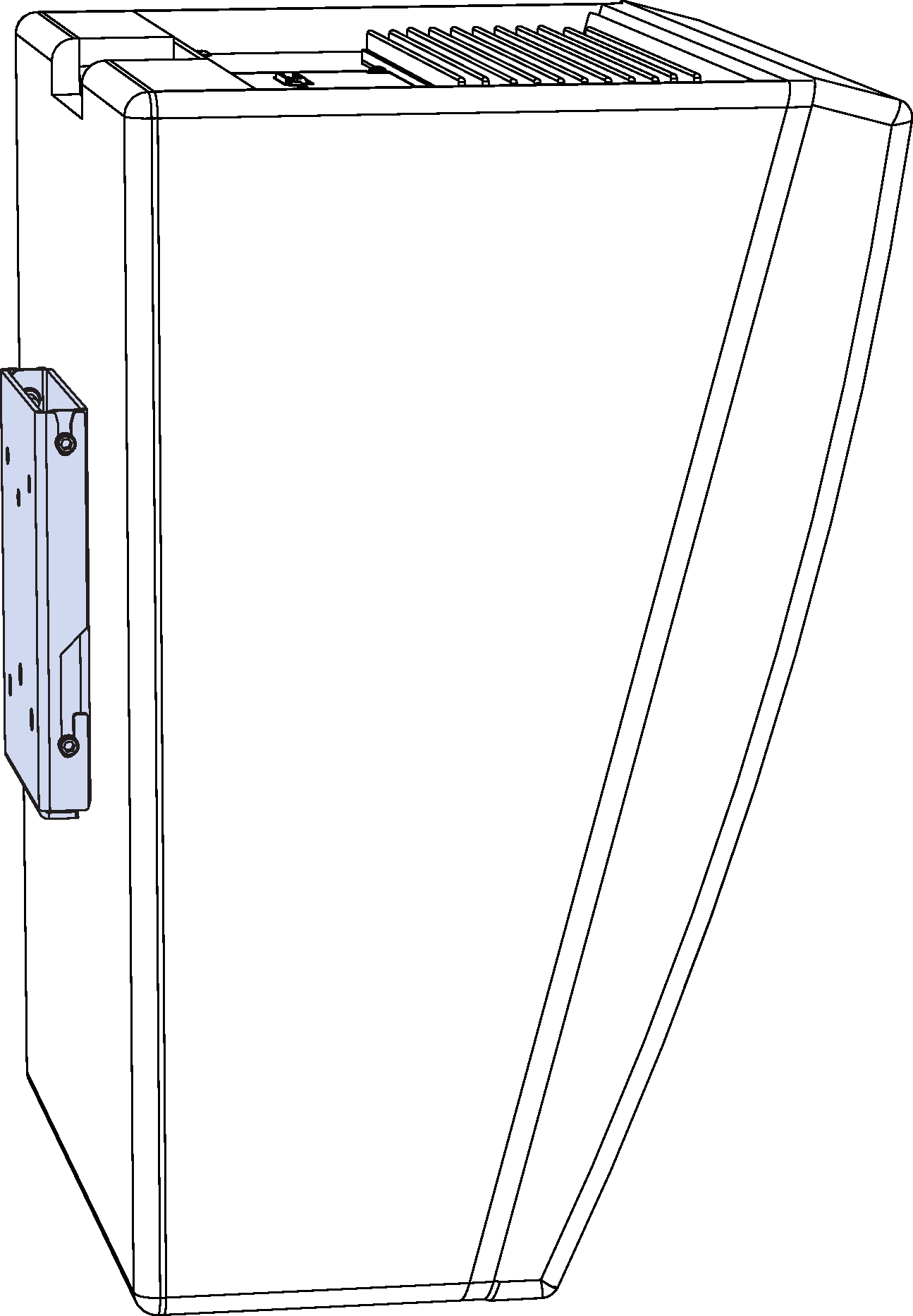 |
FMB-HMS Fixed Mount Bracket
HY-HMS / MYA-HMS-15 Yokes — Suspends HMS loudspeakers with a full range of tilt (360°). The yokes can attach directly to ceilings or can accept “C” or “G” hanging clamps with standard 1/2-inch or 12 mm bolts.
Weight — HY-HMS, 12.4 lb (5.6 kg); MYA-HMS-15, 7.6 lb (3.4 kg)
Compatibility (HY-HMS) — HMS-5 (360°), HMS-10 (360°), HMS-12 (360°)
Compatibility (MYA-HMS-15) — HMS-15/15AC (360°)
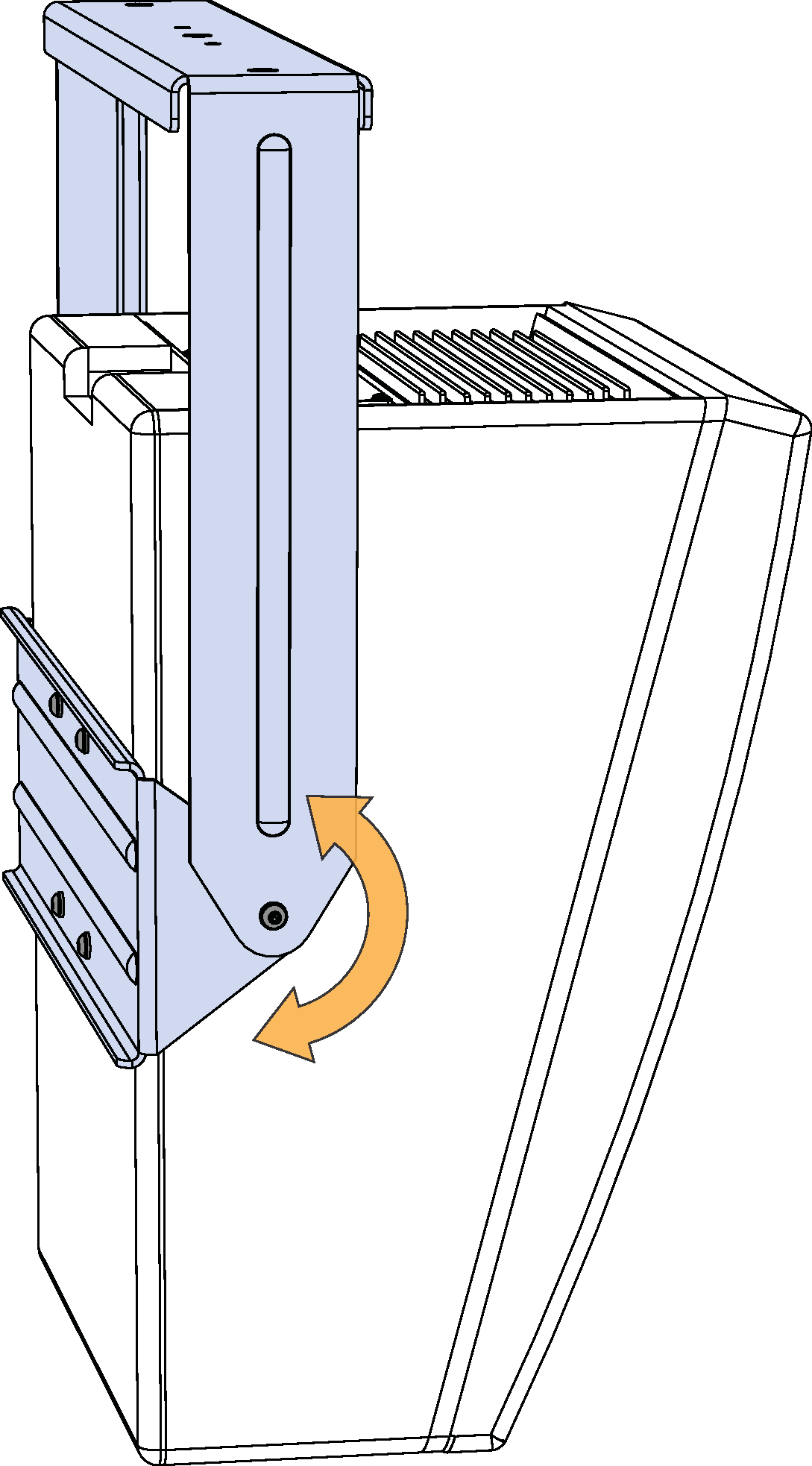 |
HY-HMS / MYA-HMS-15 Yokes (HY-HMS Yoke shown)
AMB-HMS Adjustable Mount Bracket — Mounts HMS loudspeakers on walls with uptilt or downtilt (see below for tilt amounts). When installed with no tilt, the bracket mounts cabinets 2.24 inches (57 mm) from the wall.
Weight — 4.2 lbs (1.9 kg)
Compatibility — HMS-5 (+5°/–16°), HMS-10 (+5°/–16°), HMS-12 (+5°/–12°). HMS-15/15AC (+5°/–10°)
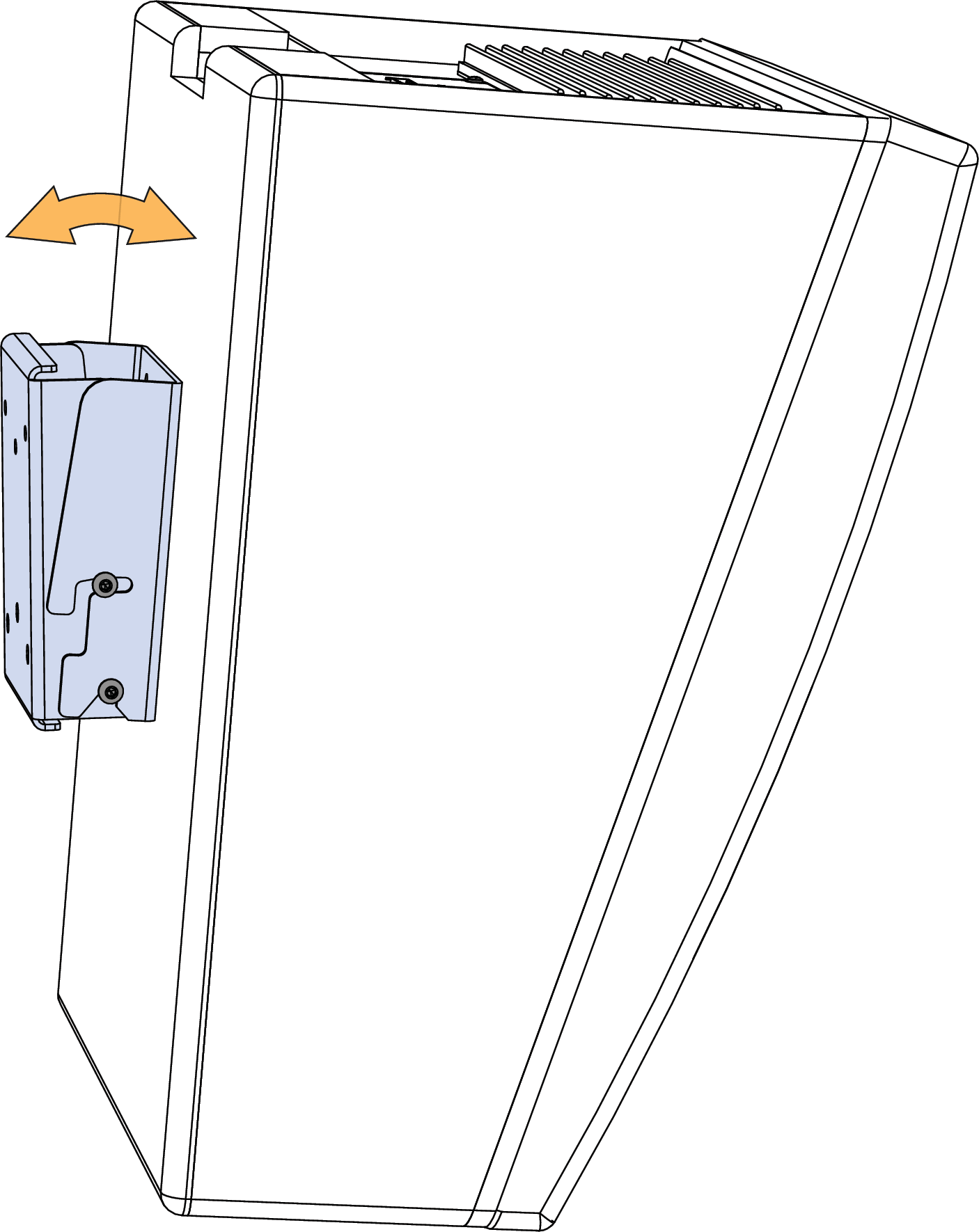
AMB-HMS Adjustable Mount Bracket
MUB-HMS / MUB-HMS15 U-Brackets — Mounts HMS loudspeakers on walls or ceilings with uptilt or downtilt (see below for tilt amounts). The U-brackets include variable attachment points to place cabinets closer or further from the mounting surface.
Weight — MUB-HMS, 13.5 lbs (6.1 kg); MUB-HMS15, 7.6 lbs (3.4 kg)
Compatibility (MUB-HMS) — HMS-5 (+60°/–43°), HMS-10 (+32°/–25°), HMS-12 (+23°/–20°)
Compatibility (MUB-HMS15) — HMS-15/15AC
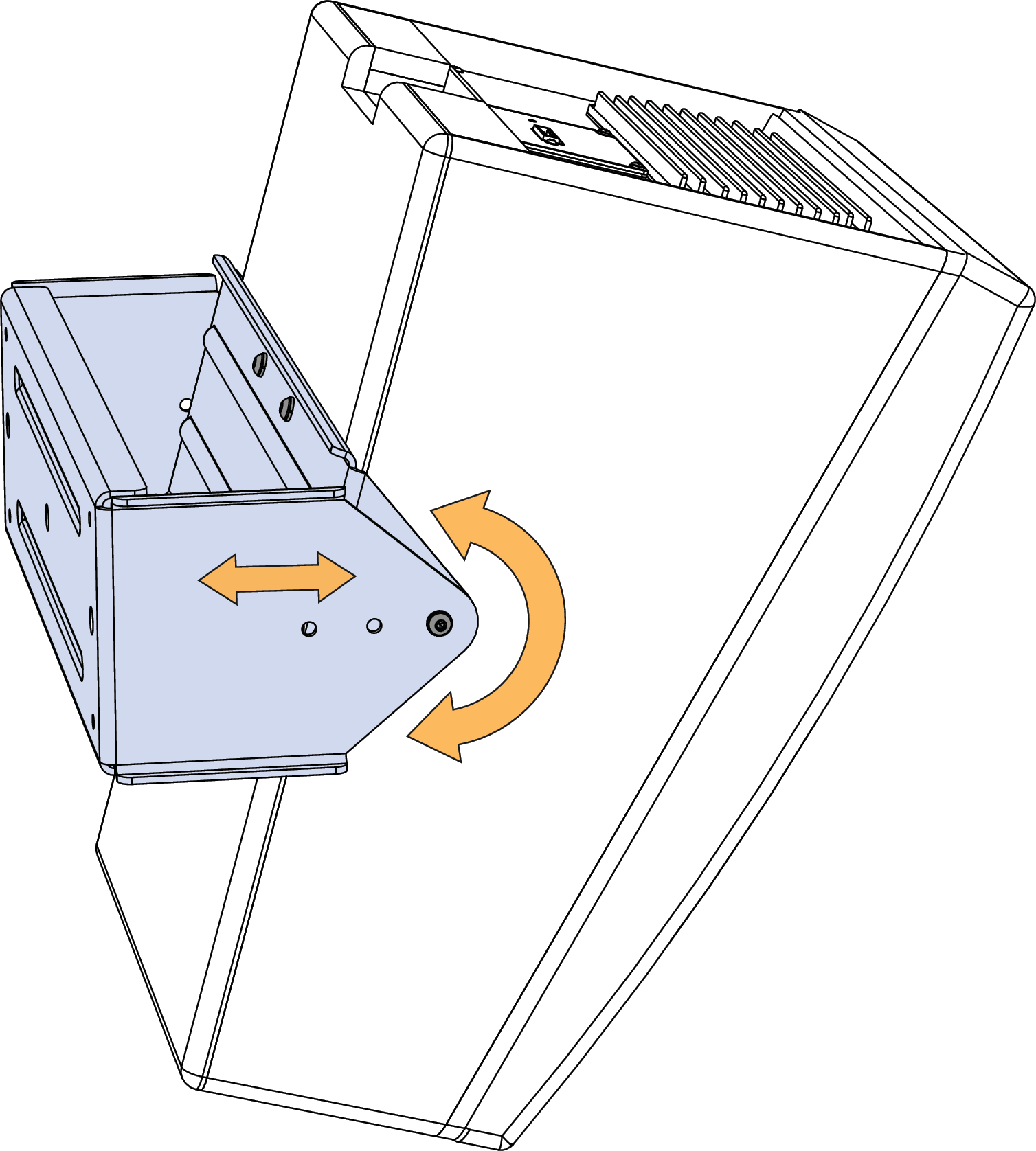
MUB-HMS / MUB-HMS15 U-Brackets
WH-HMS Wall Hinge Bracket — Mounts HMS loudspeakers on walls with the capability of aiming them horizontally up to 90° away from the wall. The bracket is symmetrical, allowing it to be rotated 180° so cabinets can be aimed either toward or away from the screen.
Weight — 10.4 lbs (4.7 kg)
Compatibility — HMS-5, HMS-10, HMS-12
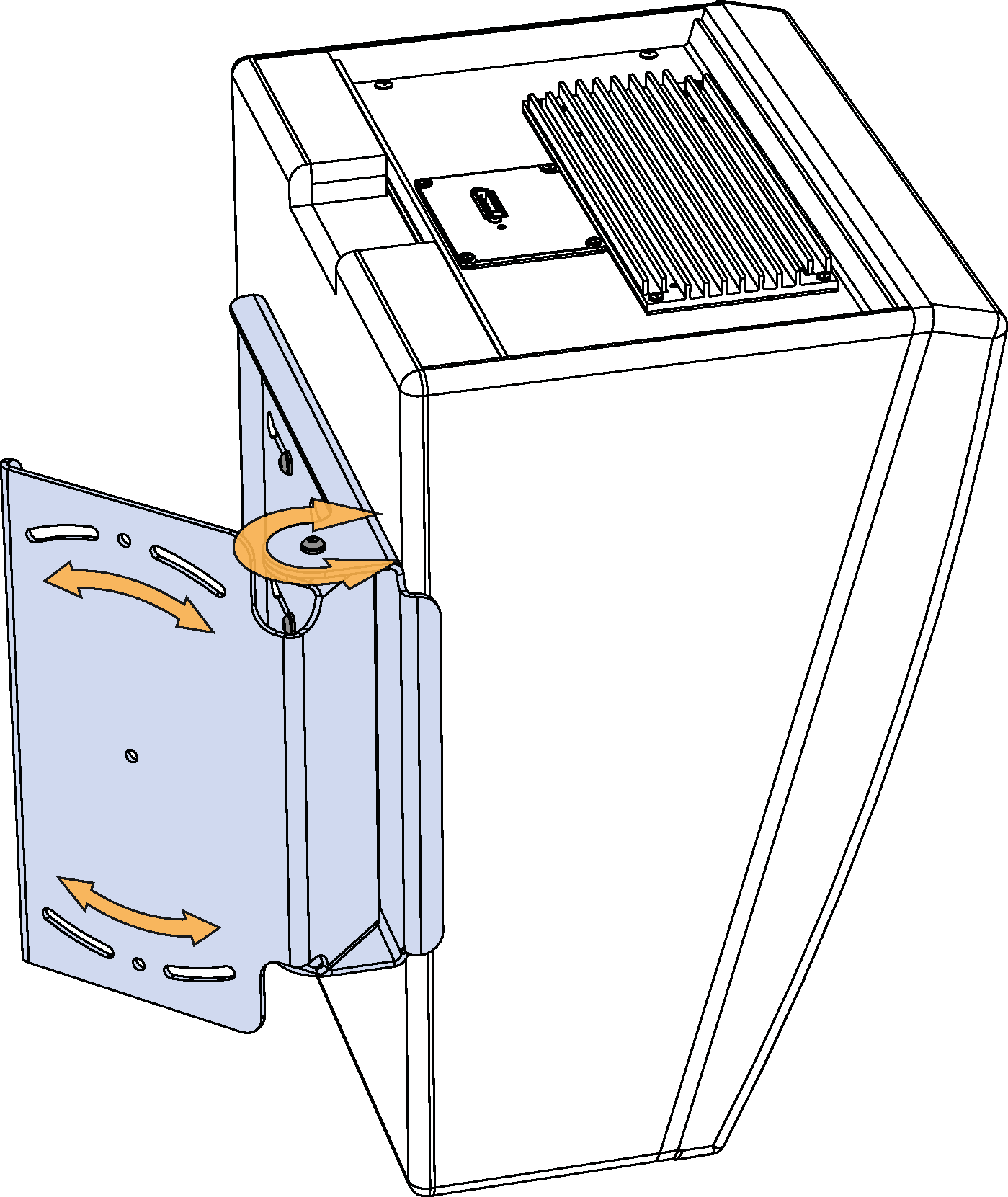 |
WH-HMS Wall Hinge Bracket
 |
WH-HMS Wall Hinge Bracket (Top View)
Specifications
ACOUSTICAL1 | HMS-5 | HMS-10 | HMS-12 | HMS-15 | HMS-15AC |
Operating Frequency Range2 | 55 Hz – 18 kHz | 55 Hz – 18 kHz | 59 Hz – 18 kHz | 50 Hz – 18 kHz | 50 Hz – 18 kHz |
Frequency Response3 | 56 Hz – 18 kHz ± 4 dB | 57 Hz – 17 kHz ± 4 dB | 60 Hz – 18 kHz ± 4 dB | 54 Hz – 16 kHz ± 4 dB | 54 Hz – 16 kHz ± 4 dB |
Phase Response | e 250 Hz – 18 kHz ±45° | 290 Hz – 18 kHz ±45° | 240 Hz – 18 kHz ±45° | 290 Hz – 18 kHz ±45° | 290 Hz – 18 kHz ±45° |
Linear Peak SPL4 | 121 dB with crest factor >17 dB (M-noise), 119 dB (Pink noise), 120 dB (B-noise) | 125.5 dB with 19.5 dB crest factor (M-noise), 122 dB (Pink noise), 123.5 dB (B-noise) | 128 dB with crest factor >16 dB (M-noise), 125.5 dB (Pink noise), 128 dB (B-noise) | 132 dB with crest factor >16 dB (M-noise), 129.5 dB (Pink noise), 131.5 dB (B-noise) | 132 dB with crest factor >16 dB (M-noise), 129.5 dB (Pink noise), 131.5 dB (B-noise) |
COVERAGE | |||||
Horizontal Coverage | 80° | 80° | 100° | 80° | 80° |
Vertical Coverage | 80° | 80° | 100° | 50° | 50° |
TRANSDUCERS | |||||
Low Frequency | Two 5-inch long- excursion cone drivers; 8 Ω nominal impedance | One 10-inch long- excursion cone driver; 4 Ω nominal impedance | One 12-inch long- excursion cone driver; 4 Ω nominal impedance | One 15-inch long- excursion cone driver; 2 Ω nominal impedance | One 15-inch long- excursion cone driver; 2 Ω nominal impedance |
High Frequency | One 2-inch diaphragm compression driver; 12 Ω nominal impedance | One 2-inch diaphragm compression driver; 12 Ω nominal impedance | One 3-inch diaphragm compression driver; 16 Ω nominal impedance | One 3-inch diaphragm compression driver; 16 Ω nominal impedance | One 3-inch diaphragm compression driver; 16 Ω nominal impedance |
AUDIO INPUT | |||||
Type | Differential, electronically balanced | ||||
Maximum Common Mode Range | ±15 V DC, clamped to earth for voltage transient protection | ||||
Connectors | One Phoenix 5-pin male composite input | XLR 3-pin female input with male loop output | |||
Input Impedance | 10 kΩ differential between Audio (+) and Audio (–) | ||||
Wiring | Pin 1: DC power (–); Pin 2: DC power (+); Pin 3: Audio shield chassis/earth; Pin 4: Audio (–); Pin 5: Audio (+) | Pin 1: Chassis/earth through 220 kΩ, 1000 pF, 15 V clamp network to provide virtual ground lift at audio frequencies Pin 2: Audio (+) Pin 3: Audio (–) Case: Earth ground and chassis | |||
Nominal Input Sensitivity | 6 dBV (2.0 V rms) continuous is typically the onset of limiting for noise and music | 2.0 dBV (1.3 V rms) continuous is typically the onset of limiting for noise and music. Note: with the Pad switch enabled, the input sensitivity is 9.5 dBV (3.0 V rms) | 2.0 dBV (1.3 V rms) continuous is typically the onset of limiting for noise and music | 3.0 dBV (1.4 V rms) continuous is typically the onset of limiting for noise and music | 3.0 dBV (1.4 V rms) continuous is typically the onset of limiting for noise and music |
Input Level | Audio source must be capable of producing of +20 dBV (10 V rms) into 600 Ω to produce the maximum peak SPL over the operating bandwidth of the loudspeaker. | ||||
AMPLIFIER | |||||
Type | 3-channel with active crossover | 2-channel with active crossover | 2-channel with active crossover | 2-channel with active crossover | 2-channel with active crossover |
Total Output Power5 | 600 W peak | 600 W peak | 550 W peak | 1000 W peak | 1000 W peak |
THD, IM, TIM | < 0.02% | ||||
Cooling | Convection | ||||
POWER | DC POWER | AC POWER | |||
Connector | One Phoenix 5-pin male composite input (see Wiring above) | Two Phoenix 5-pin male6 | powerCON 20 input with loop output | ||
Voltage Requirements7 | 48 V DC (Meyer Sound IntelligentDC External Power Supply Required) | N/A | |||
Automatic Voltage Selection | N/A | 90–265 V AC | |||
Safety Agency Rated Voltage Range | N/A | 100–240 V AC, 50–60 Hz | |||
Turn-on and Turn-off Points | N/A | 90 V AC turn-on, no turn-off; internal fuse- protection above | |||
CURRENT DRAW | |||||
Idle Current | N/A | 0.23 A rms at 115 V AC 0.22 A rms at 230 V AC 0.25 A rms at 100 V AC | |||
Maximum Long-Term Continuous Current (>10 sec) | N/A | 1.3 A rms at 115 V AC 0.7 A rms at 230 V AC 1.5 A rms at 100 V AC | |||
Burst Current (<1 sec)7 | N/A | 2.9 A rms at 115 V AC 1.5 A rms at 230 V AC 3.1 A rms at 100 V AC | |||
Maximum Instantaneous Peak Current | N/A | 7.0 A peak at 115 V AC 3.8 A peak at 230 V AC 7.7 A peak at 100 V AC | |||
Inrush Current | N/A | <20.0 A peak | |||
RMS NETWORK | |||||
Requires RMS option on the MPS IntelligentDC power supply. Reports voltage and current draw for the attached IntelligentDC loudspeakers to the host computer. | Optionally equipped with two-conductor twisted- pair network | ||||
PHYSICAL | |||||
Dimensions | W: 15.00 in (381 mm) x H: 12.45 in (316 mm ) x D: 9.66 in (245 mm | W: 15.50 in (394 mm) x H: 19.50 in (495 mm) x D: 12.48 in (317 mm) | W: 16.80 in (427 mm) x H: 25.12 in (638 mm) x D: 9.78 in (248 mm) | W: 19.00 in (483 mm) x H: 29.10 in (739 mm) x D: 12.50 in (318 mm) | W: 19.00 in (483 mm) x H: 29.10 in (739 mm) x D: 12.50 in (318 mm) |
Weight | 18.4 lb (8.3 kg) | 26.2 lb (11.9 kg) | 43.0 lb (19.5 kg) | 60.0 lb (27.2 kg) | 64.0 lb (29.0 kg) |
Enclosure | Premium multi-ply birch with slightly textured black finish | ||||
Grille Frame | Acoustically transparent, detachable, black cloth-covered frame | ||||
Rigging | Rear attachment points 3.94 in x 3.94 in (100 mm x 100 mm) | Rear attachment points 3.94 in x 3.94 in (100 mm x 100 mm) | Rear attachment points 3.94 in x 3.94 in (100 mm x 100 mm) | Rear attachment points 5.00 in x 2.75 in, (127 mm x 70 mm); side attachment points with 3/8-inch-16 threads | Rear attachment points 5.00 in x 2.75 in (127 mm x 70 mm); side attachment points with 3/8-inch-16 threads |
ACCESSORY APPLICABILITY | |||||
FMB-HMS Fixed Bracket | √ | √ | √ | √ | √ |
AMB-HMS Adjustable Bracket | √ | √ | √ | √ | √ |
HY-HMS Half Yoke | √ | √ | √ | ||
MYA-HMS-15 Yoke | √ | √ | |||
MUB-HMS U-Bracket | √ | √ | √ | ||
MUB-HMS15 U-Bracket | √ | √ | |||
WH-HMS Wall Hinge Bracket | √ | √ | √ | ||
Notes
Loudspeaker system predictions for coverage and SPL are available in Meyer Sound’s MAPP System Design Tool.
Recommended maximum operating frequency range. Response depends on loading conditions and room acoustics.
Free-field, measured with 1/3 octave frequency resolution at 4 m.
Linear Peak SPL is measured in free-field at 4 m referred to 1 m. Loudspeaker SPL compression measured with M-noise at the onset of limiting, 2-hour duration, and 50 °C ambient temperature is < 2 dB.
M-noise is a full bandwidth (10 Hz–22.5 kHz) test signal developed by Meyer Sound to better measure the loudspeaker’s music performance. It has a constant instantaneous peak level in octave bands, a crest factor that increases with frequency, and a full bandwidth Peak to RMS ratio of 18 dB. The presence of a greater-than (>) symbol with regard to crest factor indicates it may be higher depending on EQ and boundary loading.
Pink noise is a full bandwidth test signal with Peak to RMS ratio of 12.5 dB.
B-noise is a Meyer Sound test signal used to ensure measurements reflect system behavior when reproducing the most common input spectrum, and to verify there is still headroom over pink noise.
Peak power based on the maximum unclipped peak voltage the amplifier will produce into the nominal load impedance.
The HMS-15 must be connected to two adjacent channels of the MPS IntelligentDC power supply.
AC power cabling must be of sufficient gauge so that under burst current rms conditions, cable transmission losses do not cause the loudspeaker’s voltage to drop below the specified operating range.
Architectural Specifications
HMS-5
The loudspeaker shall be a self-powered, full-range system with an onboard 3-channel amplifier and internal processing that shall include equalization, phase correction, signal division, and driver protection. Transducers shall include two 5-inch long-excursion cone drivers and one 2-inch diaphragm compression driver. The crossover point shall be 1.7 kHz.
Performance specifications, measured at 1/3-octave resolution, for a typical production unit shall be: operating frequency range, 55 Hz to 18 kHz; phase response, 250 Hz to 18 kHz ±45°; linear peak SPL, 121 dB with crest factor >17 dB (M-noise). Coverage shall be 80° horizontal by 80° vertical.
The loudspeaker shall be equipped with a single Phoenix 5-pin male connector (two pins for DC power and three pins for balanced audio). Power requirements for the loudspeaker shall be a Meyer Sound MPS IntelligentDC power supply.
Components shall be mounted in a premium multi-ply birch enclosure with a slightly textured black finish. The cabinet shall include rear attachment points for optional mounting. The grille shall be an acoustically transparent, detachable, black cloth-covered frame. Dimensions for the loudspeaker shall be W: 15.00 in (381 mm) x H: 12.45 in (316 mm ) x D: 9.66 in (245 mm) without mounting bracket. Weight shall be 18.4 lb (8.3 kg).
The loudspeaker shall be the Meyer Sound HMS-5.
HMS-10
The loudspeaker shall be a self-powered, full-range system with an onboard 2-channel amplifier and internal processing that shall include equalization, phase correction, signal division, and driver protection. Transducers shall include one 10-inch long-excursion cone driver and one 2-inch diaphragm compression driver. The crossover point shall be 2.5 kHz.
Performance specifications, measured at 1/3-octave resolution, for a typical production unit shall be: operating frequency range, 55 Hz to 18 kHz; phase response, 290 Hz to 18 kHz ±45°; linear peak SPL, 125.5 dB with 19.5 dB crest factor (M-noise). Coverage shall be 80° horizontal by 80° vertical.
The loudspeaker shall be equipped with a single Phoenix 5-pin male connector (two pins for DC power and three pins for balanced audio). Power requirements for the loudspeaker shall be a Meyer Sound MPS IntelligentDC power supply.
Components shall be mounted a premium multi-ply birch enclosure with a slightly textured black finish. The cabinet shall include rear attachment points for optional mounting. The grille shall be an acoustically transparent, detachable, black cloth-covered frame. Dimensions for the loudspeaker shall be W: 15.50 in (394 mm) x H: 19.50 in (495 mm) x D: 12.48 in (317 mm) without mounting bracket. Weight shall be 26.2 lb (11.9 kg).
The loudspeaker shall be the Meyer Sound HMS-10.
HMS-12
The loudspeaker shall be a self-powered, full-range system with an onboard 2-channel amplifier and internal processing that shall include equalization, phase correction, signal division, and driver protection. Transducers shall include one 12-inch long-excursion cone driver and one 3-inch diaphragm compression driver. The crossover point shall be 840 Hz.
Performance specifications, measured at 1/3-octave resolution, for a typical production unit shall be: operating frequency range, 59 Hz to 18 kHz; phase response, 240 Hz to 18 kHz ±45°; linear peak SPL, 128 dB with crest factor >16 dB (M-noise). Coverage shall be 100° horizontal by 100° vertical.
The loudspeaker shall be equipped with a single Phoenix 5-pin male connector (two pins for DC power and three pins for balanced audio). Power requirements for the loudspeaker shall be a Meyer Sound MPS IntelligentDC power supply.
Components shall be mounted in a premium multi-ply birch enclosure with a slightly textured black finish. The cabinet shall include rear attachment points for optional mounting. The grille shall be an acoustically transparent, detachable, black cloth-covered frame. Dimensions for the loudspeaker shall be W: 16.80 in (427 mm) x H: 25.12 in (638 mm) x D: 9.78 in (248 mm) without mounting bracket. Weight shall be 43 lb (19.5 kg).
The loudspeaker shall be the Meyer Sound HMS-12.
HMS-15
The loudspeaker shall be a self-powered, full-range system with an onboard 2-channel amplifier and internal processing that shall include equalization, phase correction, signal division, and driver protection. Transducers shall include one 15-inch long-excursion cone driver and one 3-inch diaphragm compression driver. The crossover point shall be 680 Hz.
Performance specifications, measured at 1/3-octave resolution, for a typical production unit shall be: operating frequency range, 50 Hz to 18 kHz; phase response, 290 Hz – 18 kHz ±45°; linear peak SPL, 132 dB with crest factor >16 dB (M-noise). Coverage shall be 80° horizontal by 50° vertical.
The loudspeaker shall be equipped with dual Phoenix 5-pin male connectors (two pins for DC power and three pins for balanced audio). Power requirements for the loudspeaker shall be a Meyer Sound MPS IntelligentDC power supply.
Components shall be mounted in a premium multi-ply birch enclosure with a slightly textured black finish. The cabinet shall include rear and side attachment points for optional mounting. The grille shall be an acoustically transparent, detachable, black cloth-covered frame. Dimensions for the loudspeaker shall be W: 19.00 in (483 mm) x H: 29.10 in (739 mm) x D: 12.50 in (318 mm) without mounting bracket. Weight shall be 60 lb (27.2 kg).
The loudspeaker shall be the Meyer Sound HMS-15.
HMS-15AC
The loudspeaker shall be a self-powered, full-range system with an onboard 2-channel amplifier and internal processing that shall include equalization, phase correction, signal division, and driver protection. Transducers shall include one 15-inch long-excursion cone driver and one 3-inch diaphragm compression driver. The crossover point shall be 680 Hz.
Performance specifications, measured at 1/3-octave resolution, for a typical production unit shall be: operating frequency range, 50 Hz to 18 kHz; phase response, 290 Hz – 18 kHz ±45°; linear peak SPL, 132 dB with crest factor >16 dB (M-noise). Coverage shall be 80°horizontal by 50° vertical.
Audio connectors shall be XLR 3-pin, female and male, accommodating balanced audio, or XLR 5-pin, accommodating both balanced audio and RMS. The internal power supply shall perform automatic voltage selection, EMI filtering, soft current turn-on, and surge suppression. Power requirements shall be nominal 100, 110, or 230 V AC line current at 50–60 Hz. UL and CE operating voltage range shall be 100–240 V AC at 50–60 Hz. Maximum long-term continuous current draw shall be 1.3 A rms at 115 V AC, 0.7 rms at 230 V AC, and 1.5 A rms at 100 V AC. AC power connectors shall be powerCON 20 with loop output. The loudspeaker shall optionally include the RMS remote monitoring system module.
Components shall be mounted in a premium multi-ply birch enclosure with a slightly textured black finish. The cabinet shall include rear and side attachment points for optional mounting. The grille shall be an acoustically transparent, detachable, black cloth-covered frame. Dimensions for the loudspeaker shall be W: 19.00 in (483 mm) x H: 29.10 in (739 mm) x D: 12.50 in (318 mm) without mounting bracket. Weight shall be 64 lb (29.0 kg).
The loudspeaker shall be the Meyer Sound HMS-15AC.